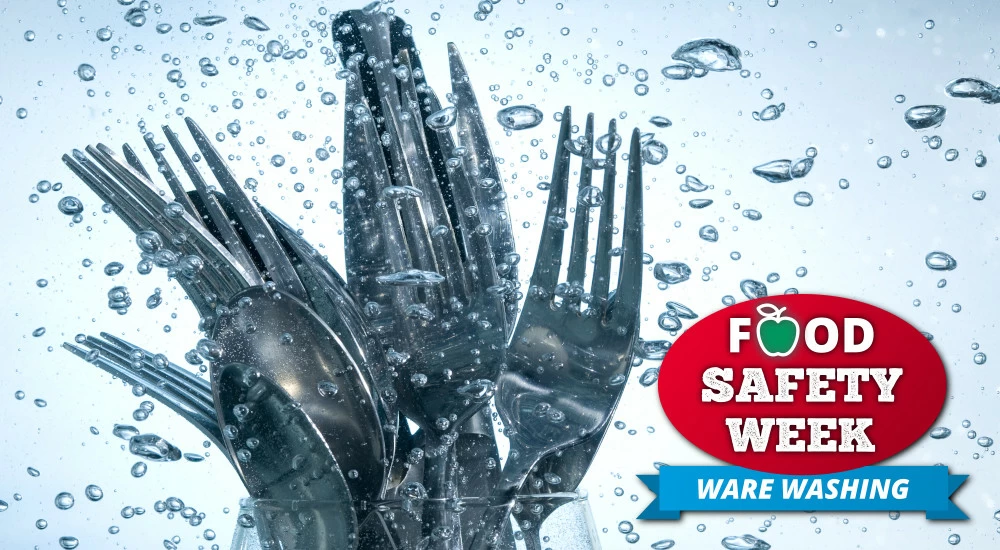Food Safety Month – Are Your Commercial Dishwashers Operating at the Correct Temperature to Remove Bacteria and Norovirus

By – The Editor
Our third and final blog for National Food Safety Education Month reviews the importance of the cleanup or “post-cooking stage”; the disinfecting and sanitizing while warewashing (dishwashing) of dishes and equipment.
Dishwashing is a major part of your commercial kitchen’s hygiene and sanitation process. Your commercial dishwasher must operate at the correct temperature to disinfect and sanitize for bacteria and norovirus. Here’s how to ensure your dishwasher keeps your customers safe.
How Do Commercial Dishwashers Sanitize?
The final stage of your dishwashing cycle plays a key role in protecting your customers from foodborne illness and other forms of bacteria. Dishes must be washed at a temperature of 165°F for a stationary rack or at least 180°F for all other types of dishwashers. This meets the requirements to eliminate 99.999% of microorganisms and bacteria, a 5-log reduction. During a proper sanitizing cycle, dishes must reach a temperature of 160°F for 10 seconds. The only way to do this is to rinse dishes at 180°F or higher.
Safe Temperature Settings for a Commercial Dishwasher
Commercial dishwashers can range from 120 to 180 degrees Fahrenheit depending on the model. The temperature varies based on the cycle. This is because the temperature required during cycles where detergents are used are different from the temperatures used during a rinse cycle. There are two types of dishwashers as well, each reaching different temperatures while operating.
This includes:
1. High-temperature dishwashers: These models use 150 to 160 degrees to wash and 180 degrees Fahrenheit to rinse and sanitize.
2. Low-temperature dishwashers: These models wash and rinse at 120 to 140 degrees Fahrenheit and therefore are not suitable to meet sanitizing needs according to the FDA. As a result, you’ll need to use chemical sanitizing agents with water to sanitize dishes.
The optimal type of commercial dishwasher for your operation is dependent upon factors such as how often it will be in use, turn-around time, manpower, cost of chemicals, etc. Having a manufacturer representative help you assess your needs and conduct a cost analysis is the best approach to ensure you have the best fit for your needs.
How to Keep Your Dishwasher Operating Efficiently
Commercial appliances are designed to withstand high demand. However, you can still take a proactive approach to keep them working efficiently including:
● Commercial Kitchen Equipment Thermostat Calibration: Because correct dishwasher temperatures are a must to disinfect and sanitize dishes, having regularly scheduled commercial dishwasher maintenance and repair appointments is an excellent way to ensure your thermostat is calibrated for accurate readings.
● Gaskets: Another important component your commercial dishwasher maintenance and repair expert can check is your dishwasher gaskets. These components ensure the chemicals being delivered throughout your dishwasher cycles aren’t set too high. If set too high the chemicals will corrode the gaskets as can soaps, sanitizers, and improper water filtration. With proper maintenance, damaged gaskets can be replaced so your dishwasher continues to operate safely and efficiently. With new gaskets, your dishwasher takes less time to complete the washing process as there is proper pressure in your machine.
● Curtains: The curtain in your conveyor, pass-through, or under-counter commercial dishwasher keeps the different cavities separated. They also hold heat in the cavity to help with sanitation. When curtains are dried out and curled, they allow heat, water, and steam to escape. The leaking water can spry out and even possibly burn someone. Rinse water temps are in excess of 180 and generally set to around 195. New curtains will ensure a safer work environment and a more efficient and economical warewasher.
● Descaling Booster Heater: No matter if your water is hard or soft, Lime Scale will periodically build up on your Booster Heaters heating element and tank. It is important to have it descaled regularly to keep it at peak efficiency to keep temperatures correct and allow for maximum dishes.
Commercial appliance maintenance will prolong your dishwasher’s lifespan, reduce running costs, and improve performance. It is the best way to help your dishwasher maintain the correct temperatures to disinfect and sanitize for bacteria.
Did you know: The first commercially successful dishwasher was invented in 1887 by Josephine Cochrane in her tool shed in Shelbyville, TN. Tired of having her heirloom china from the 1600s damaged by careless washing, she is reported to have said ‘If nobody else is going to invent a dishwashing machine, I’ll do it myself’
Call to set an appointment or submit an online Book Service Form if your warewashing equipment is in need of maintenance or repair.
